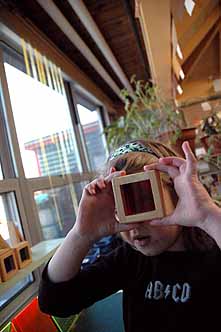 By Geoff Griffin
By Geoff Griffin
Play is in the headlines these days, with NPR and the New York Times trumpeting its importance in developing basic cognitive and social skills.
At the Gordon School, where a play-based early childhood curriculum has weathered almost a century of educational trend cycles, these stories have been followed with interest.
When choosing a preschool, how do you judge the role of play in the school day? Ask any educator if they value play, and they will say yes.
This week, I asked the teachers in Gordon’s Early Childhood program for ideas on what to look for as you judge how much play is happening in a preschool classroom.
Listen
Play can be noisy. If the class is hushed, ask, “Is it always this quiet?”
Open-ended materials
Are students given materials that can be used in a variety of ways? There is only one way to use a puzzle piece, but many ways to use a block. Stencils are limited, but graph paper invites all sorts of uses.
How many things are going on?
If every student is doing the same activity, it is probably teacher-initiated. Look for a classroom setup that allows for several small-group activities to happen simultaneously.
Are there opportunities to work together?
Are the workplaces – the easels, the clay table, the computers – set up so that children can interact with one another while they work?
Are student interests integrated into the class?
Ask if there is space for children to initiate extended projects. Look for a student-driven “Kite Store” or “Animal Dentist” alongside the perennial “Book Nook” and “Dress Up” dramatic play areas.
Do they go outside?
How often? For how long? Look at the cubbies; snow pants, extra pair of shoes, and spare shirts are a plus.
Are they invested?
If you ask a child what they are doing, can he or she explain it? Are free play and small group times long enough for children to “lose themselves” in their work?
Listen to the children
Are they listening to one another, and building on one another’s ideas? Are they talking to one another directly, or using the teacher as a go-between?
Geoff Griffin is a parent at Gordon and has been Gordon’s Manager of Publications and Public Relations since 2002.
Additional articles about play provided by the Gordon School:
NPR: Creative Play Makes for Kids in Control
NPR: Old-Fashioned Play Builds Serious Skills
New York Times: Taking Play Seriously
Howard Chudacoff’s book (Brown University): Children at Play: An American History
A Gordon School News article, circa 2003









As a parent of two children at the Gordon School, I can tell you that some pretty incredible learning goes on in the spirit of “play.” One of the reasons we have chosen Gordon and remain there is that our children truly enjoy school — they can’t get there soon enough and just hate it if they have to miss a day due to sickness. They take their homework seriously and adore their teachers — the very same teachers who might interrupt a fifth grade class and make the children run around outside for 2 minutes screaming joyfully — because when they return to their studies they are refreshed, in body and spirit, and ready to learn. I thoroughly believe that kindndess, laughter, fresh air, creative thinking and the occasional twist on the average approach is part of what makes my fourth and fifth grade girls so excited to get to school, and so ready to absorb and retain information.
the co-op nursery schools on the east side–east side nursery school and child’s play–both have play-based curricula. the tuition at these schools is about $2000 (a four digit tuition) a year, more or less.
they are both really good schools with nice families involved & nice kids attending!
Thank you Geoff for putting the article into the broader context of why “play” is an important part of education for children and not just about the Gordon School specifically. I agree that play is important whether it takes place in a formal school setting and how we as parents may adapt these priniciples into our own lives. Where we send our children to school is an important choice we as parents make but educating our children also starts at home with their family. Geoff also makes a good point about what parents “invest” in their child’s education may come in all forms and whatever choices we make must be the “best fit” for the family.
When a parent recently asked me “How to Choose the Best Preschool?” I told them a similar answer – that we need to decide what makes a great preschool is looking at the school philosophy along with the needs of our own children and own family situation. (see full answer under comments – https://kidoinfo.com/how-to-choose-the-best-preschool/). I believe parents have to look at the total picture – school and family – and decide how they can best invest in their child’s development.
At Kidoinfo we applaud all the recent news regarding play for our children. With all the current toys on the market today that do everything already for children and computers introduced to children at an earlier and earlier age it is good to be reminded of the value of open-ended play and encouraging children to work to together at school and at home. I encourage others to adapt these principles of play into their home as well.
I’m not sure how you meant this, but you raise an issue that is worth taking seriously.
“Play-based learning” is a classroom strategy, not a price point. It is possible to spend thirty thousand dollars on a program that puts something besides play at the center. It is also possible to spend a fraction of that and get your child a richly play-based experience.
I doubt you could find a parent at Gordon who says their tuition investment comes out of “spare” funds. An independent school education is a significant financial commitment.
Families are at Gordon because the school – the play-based early childhood program, but also the rest of the Nursery through eighth grade package – is the best fit for their family. Not because they have money to spare.
I’d bet everyone reading kidoinfo is making a huge investment in their child’s education. Some of us may be putting our careers into overdrive to earn the cash for tuition, housing in the “right” district, etc. Some of us are putting careers on hold to homeschool, volunteer with cooperatives and PTOs, etc. And so on. It’s not easy for any of us.
As Play (with a capital p) gets some headlines, it seemed to me (and Anisa) that a consumer guide might be welcome. When ideas get trendy, it can be easy to lose track of why they were important in the first place.
Gordon teachers have been explaining play-based education to parents for almost century (including long droughts where it was NOT the hot educational topic). It’s my hope and their hope that the piece helps readers make an informed choice when they invest in a play-based program.
Ahh. If only I had a spare $15,000 to spend….